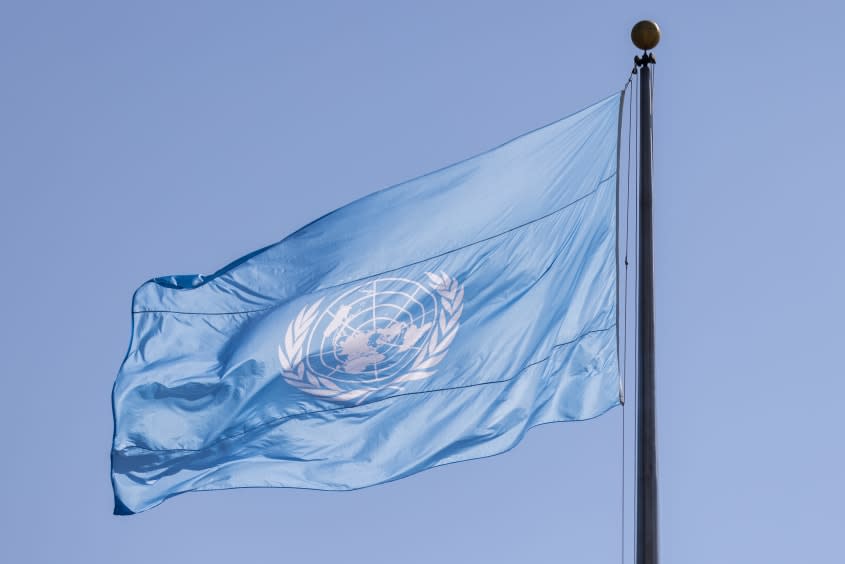4 global organizations the US rejoined after Trump pulled the plug

- Oops!Something went wrong.Please try again later.
- Oops!Something went wrong.Please try again later.
The Biden administration recently announced plans to rejoin UNESCO, the United Nation's educational and scientific organization, five years after former President Donald Trump withdrew the United States from the organization. Coming back to the organization would "help us address a key opportunity cost that our absence is creating in our global competition with China," Under Secretary of State for Management John Bass said in a March briefing.
The move is the latest effort in President Joe Biden's plans to reengage with international organizations that Trump pulled out of while in office. Below is a running list of these global organizations.
United Nations Educational, Scientific and Cultural Organization (UNESCO)
The State Department submitted a letter requesting readmission to UNESCO on June 8, in which Deputy Secretary of State for Management Richard Verma proposed a "plan for the U.S. to rejoin the organization." Official readmission would "require concurrence by UNESCO's current membership," the department added. UNESCO leadership is expected to share the U.S. proposal in the coming days. Congress also agreed last year to have the U.S. make financial contributions to the organization.
"This is a strong act of confidence, in UNESCO and in multilateralism," UNESCO director-general Audrey Azoulay said in a statement.
Under Trump, the State Department announced in late 2017 that it would part ways with UNESCO the following year over what the Trump administration saw as anti-Israel bias, among other concerns. At the time, Nikki Haley, the U.S. ambassador to the UN, criticized the group for straying from its purpose and claimed that UNESCO's "extreme politicization has become a chronic embarrassment." Israel also withdrew, and both departures became official in January 2018.
There was also tension between the U.S. and UNESCO that predated Trump's departure. Over the past few decades, the two notably sparred over " ideological issues during the Cold War and the Israeli-Palestinian conflict," The Associated Press wrote. Former President Ronald Reagan also withdrew the country from the organization in 1983, an absence that lasted until former President George W. Bush rejoined in 2002.
Paris Agreement
Biden signed several executive orders on his first day in the Oval Office, including an order to have the U.S. rejoin the Paris Agreement, an international accord designed to combat global warming. The country formally rejoined the agreement a month later, in February 2021. The U.S. could "no longer delay or do the bare minimum to address climate change," Biden said at the time, deeming it a "global, existential crisis."
The "galvanizing idea" of the agreement is that "global solidarity and collective action" are the ways to prevent the "ravages of climate change," The New York Times reported, such as higher temperatures, rising sea levels and more severe storms. Including the U.S., 195 nations have signed the pact since 2016.
Trump began withdrawing the U.S. from the Paris Agreement in 2017, but the move would not be made official until Nov. 4, 2020, leaving the U.S. separated for 107 days. He believed the "draconian" pact would enforce unfair environmental standards on American businesses and workers.
World Health Organization (WHO)
Biden also signed letters reversing Trump's decision to withdraw from the World Health Organization hours after he was sworn into office. He appointed Dr. Anthony Fauci to represent the U.S. on the WHO's executive committee. Fauci announced that the country would once again fund the organization and join an international effort to evenly spread coronavirus vaccines worldwide.
In April 2020, Trump stopped funding the WHO, arguing that the organization was "mismanaging and covering up" the Covid-19 pandemic on behalf of China and claimed the U.S. had a "duty to insist on full accountability." The following month he announced that the U.S. would leave the organization, which is the United Nations' public health arm.
United Nations Human Rights Council (UNHRC)
A month after declaring the U.S. would rejoin WHO and the Paris Agreement, Secretary of State Antony Blinken announced that the U.S. also planned to rejoin the United Nations Human Rights Council. The president instructed the State Department to "reengage immediately and robustly with the UN Human Rights Council," Blinken said in a statement in February 2021. The U.S. was officially reelected as a member with 168 votes that October.
The U.S. withdrew from the controversial international body in 2018 after Trump repeatedly threatened to leave the 47-member council. His UN ambassador, Nikki Haley, slammed the "hypocritical and self-serving" global human rights group for showing "chronic bias against Israel."
You may also like
Russia reportedly tried to assassinate a high-value CIA asset in Miami
DC's 'The Flash' and Pixar's 'Elemental' disappoint at the box office

